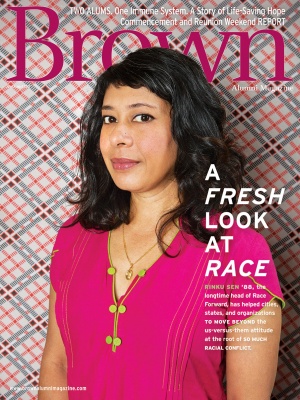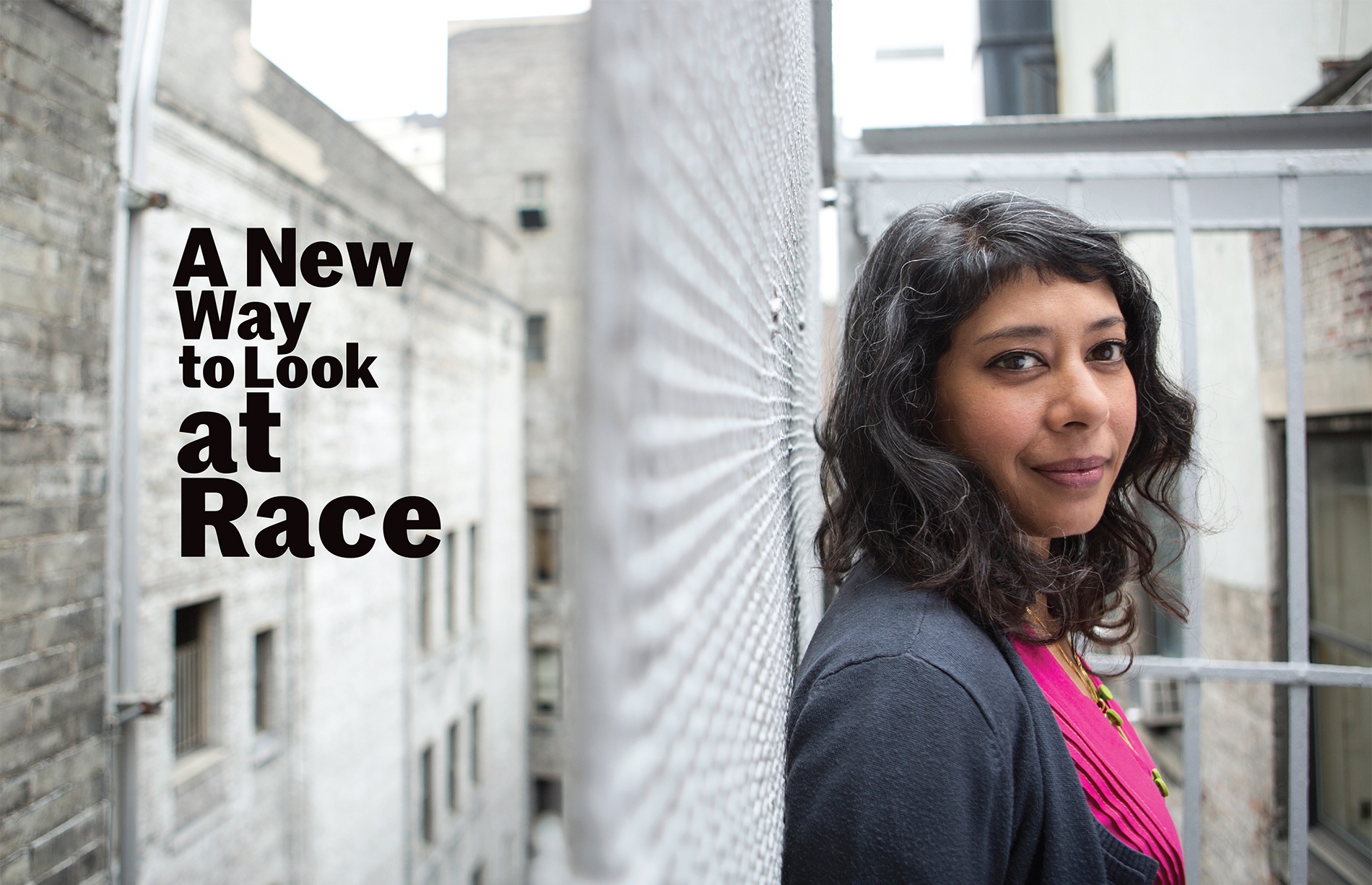
By getting people in cities, states, and organizations to think beyond us-versus-them, Rinku Sen ’88 is helping redefine how we think about racial conflict. But can she succeed in a country that may be more polarized than ever before?
In 2014, fatal police shootings of four Latino men in Salinas, California, prompted Gary Petersen, the city’s white public works director, and Ray Corpuz Jr., its Filipino city manager, to seek help understanding the city’s racial climate. They turned to a New York City–based national racial-justice organization called Race Forward, which since 2006 has been led by Rinku Sen ’88, an India-born, America-raised community organizer and author.
The choice reflected Salinas’s desire to dive deeply into its racial issues, not by simply increasing the diversity of its workforce or identifying racist individuals but by looking more fundamentally at how racial prejudice might arise from the city’s structures. Since its 1981 founding in Berkeley, California, Race Forward has embraced the idea that racial inequality goes beyond the acts and statements of individual people. It is deeply embedded within systems of governance and power. Sen has become one of the most important voices in the country urging that truly understanding racism requires drilling down into these structural inequalities and using sophisticated solutions to change them.
“Going into Salinas,” Sen recalls, “the challenge was getting people to understand what it means to be an individual ‘good person on race’ within a system. It’s very American to think that individuals are just supposed to make everything better by themselves, but, with racial justice, you can’t do that.”
Here’s just a small example of how Salinas leaders discovered how deeply racial inequity was baked into their systems: The city had a fixed amount of money for playground repairs each year and would spend it in neighborhoods that called to complain, mostly in the white, middle-class part of town. Guided by Race Forward, Peterson explains, the city looked deeper.
“I had my park guys start measuring the amount of trash we were taking out of parks, as a marker of their use,” he says. “The biggest amounts were in Alisal”—the poor, mostly Latino east side of the city—“where there were more children, fewer cars, and where people were outside more.” These were also locations, he adds, where people might not have the time or might not feel empowered to make complaint calls, or might not even know they could. “So,” he says, “we replaced the park equipment there that was most in need.”
Such data-based findings were a wake-up call for many Salinas officials who might never have linked playground repair with institutional racism. Sen, according to Peterson, was key to getting the community to face up to the issue while avoiding racial polarization. “She knows how to juggle fire,” he says. “Here she was with some of the most contentious issues of our time, yet she was able to work with a very broad base of folks and get them to have really important, sincere conversations. She has a very deep level of truth and authenticity to her approach.”
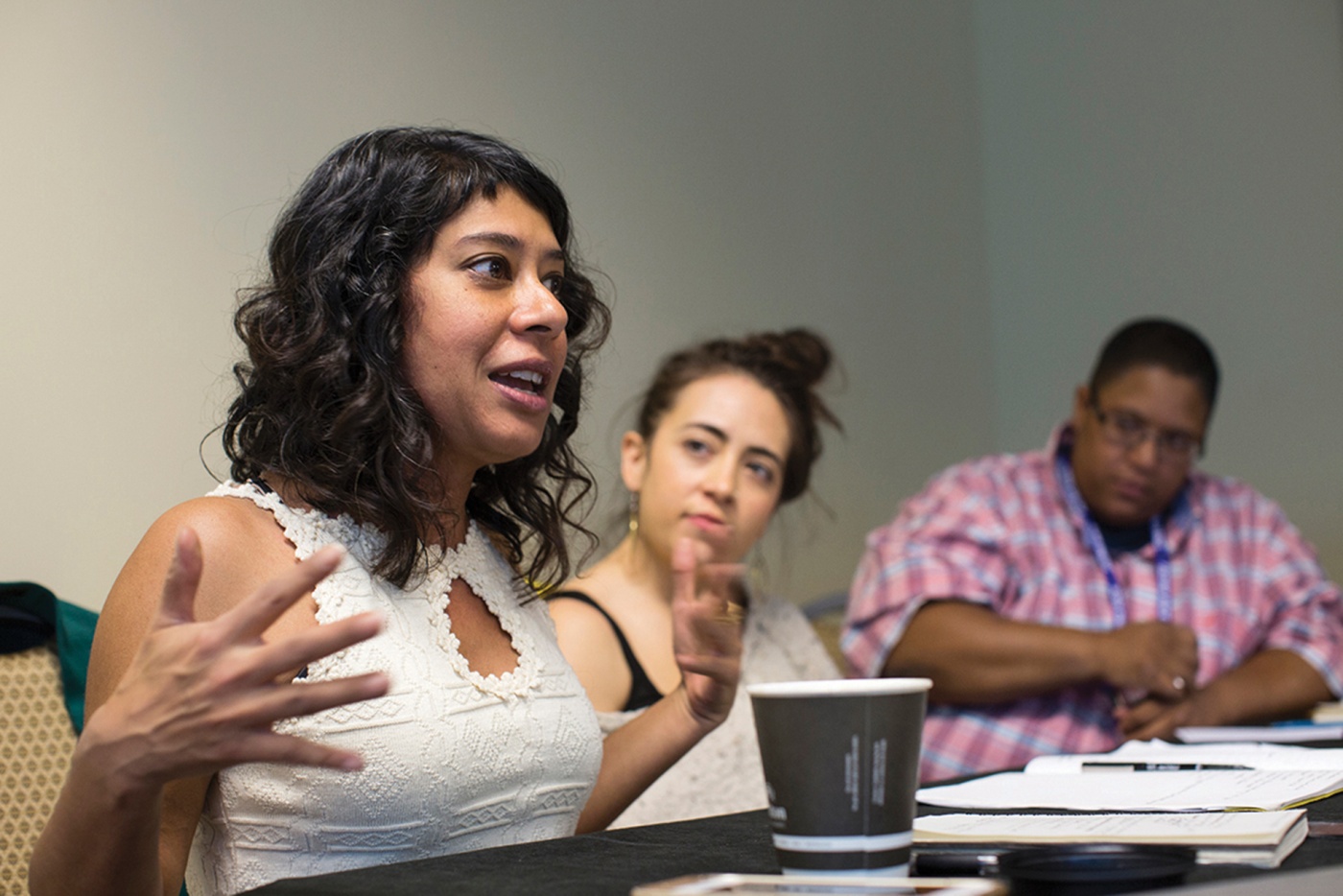
Andrea Manzo, a Mexican American community organizer in Salinas who met Sen during the trainings—and who has since become a protégé—agrees. The conversation before her arrival, she says, was about who was racist. “Rinku very skillfully shifted it away from this idea of ‘who is the perpetrator’ to ‘who is part of a system that inadvertently impacts people harmfully.’”
Sen’s training sessions in Salinas got government employees—a racially diverse group—discussing among themselves how certain policies or procedures might affect people of color in a negative way. As Sen described it in an online video, “When white city workers heard from their colleagues of color how certain policies might have unintended negative effects, they were able to understand, Oh, I can have a good intention and still be carrying out practices that have a bad impact.”
“She very gracefully dismantled the us versus them aspect,” Manzo recalls, “and everyone felt good about that and was more able to think critically.” That’s partly why activist and CNN commentator Van Jones, who’s known Sen for twenty-five years, says, “She’s always the smartest person in the room. You will never be able to count the number of people who’ve been trained by her.”
Shifting the Debate on Race
To Sen, dismantling faulty racial assumptions is the heart of the work at Race Forward. “I’d say our biggest accomplishment over the last twelve years is to shift the focus from intention to impact,” she says. “Most Americans still think racism resides in the individual and is driven by conscious animus.” By shifting the focus from how deeply racism motivates someone to how deeply and broadly it hurts people, she’s scored some major policy wins. Pushing back on bias against immigrants, for example, she persuaded multiple large news outlets nationwide to replace the term “illegal immigrant” with “undocumented immigrant.” Her work drove the Obama administration to soften some of its deportation guidelines for immigrants with children. And she’s nurtured a national news website, Colorlines, that has won a Webby Award for aggressively critiquing how race-involved stories are framed in the media.
Sen has been instrumental in expanding Race Forward not just as a training center—the organization has thus far trained more than 300 entities, ranging from cities like Salinas and Seattle and states like Minnesota to such organizations as the National Education Association union—but as a research hub. Under Sen, the organization has produced dozens of reports that use oral histories and data to show how racial inequity is present in systems ranging from food and retail workplaces to the environmental movement.
Sen seems most proud of Shattered Families, a 2011 report that detailed how mass deportations of undocumented immigrants were tearing children away from parents and pushing them into the foster-care system. She was tipped off to the story by a social worker friend who often saw undocumented immigrant mothers end a prison term only to be immediately detained and deported.
“Lots of immigration advocates told me it wasn’t a big issue,” Sen says, “but we tracked that story for five years until we got a grant to really investigate the data.” After the report was released, President Obama publicly acknowledged he was familiar with the document and, shortly thereafter, reissued immigration enforcement guidelines to soften the rupture within families. In subsequent years, Obama both dramatically reduced deportations and signed the Deferred Action for Childhood Arrivals (DACA) policy, which froze deportation directives for certain undocumented young people who came to the United States as children.
“She knows how to juggle fire. Here she was with some of the most contentious issues of our time, yet she was able to work with a very broad base of folks and get them to have really important, sincere conversations. She has a very deep level of truth and authenticity to her approach.”
Sen is careful to point out that the Shattered Families report was one of many efforts to get Obama to lighten up on deportations. But she firmly believes it “shifted the debate” on the issue. “Before the report, a lot of Americans would say they didn’t believe that families were being torn apart. But we showed that that kind of extreme separation was happening to thousands of families, not just a few.”
Shifting the debate on racial issues is something that preoccupies Sen, who is also the author of Stir It Up (a community organizing primer) and The Accidental American (a biography of immigrant-turned-food-industry activist Fekkah Mamdouh). A women’s studies concentrator at Brown who immersed herself in literary theory, Sen is highly attuned to the power of language to shape ideas and even action. Out of that focus came “Drop the I Word,” a campaign Race Forward started in 2010 to get major media to stop using the term “illegal immigrant,” which Sen and colleagues felt reinforced stigma and bias toward undocumented foreigners living and working in the United States.
The campaign persuaded the Associated Press, USA Today, and the Los Angeles Times to stop using the term. It hasn’t been as successful with the New York Times and the Washington Post, though the papers say they employ “illegal immigrant” more judiciously now.
“Rinku brought in the ability to run a sophisticated media campaign that was all about words and ideas,” says Race Forward’s founder Gary Delgado (whom Sen calls “my mentor”). Delgado is now a visiting scholar at the Institute for the Study of Social Change at UC Berkeley and a member of Race Forward’s board of directors. Sen’s “Drop the I Word” campaign, he says, “carried some of the techniques of community organizing into the realm of media, which community organizers don’t usually mess with. She faced a lot of skepticism. People said, ‘Why are you focusing on a word when immigrants are getting picked up and taken away? Who cares what they’re called?’”
But, he adds, “Rinku’s always been aware of the importance of media. I think it’s enabled her to listen more deeply to not only our constituents but our opposition.” She’s so media-attuned, in fact, that she’s been a driving force behind Colorlines, which has more than 100,000 Twitter followers. Every day, it parses the intersection of race, gender, sexuality, and (often entertainingly) pop culture, offering such headlines as “5 Times Kendrick Lamar Kicked Racism’s A** ...”
“Rinku has a huge and beautiful imagination and the chops to make her ideas happen,” says Akiba Solomon, the site’s editorial director. “Colorlines is built on the idea of news seen through the lens of race, which is pretty nuanced. But Rinku never underestimates her audience. She doesn’t talk down to people who know or have less, or talk up to people with more. She comes as she is and encourages others to do the same.”
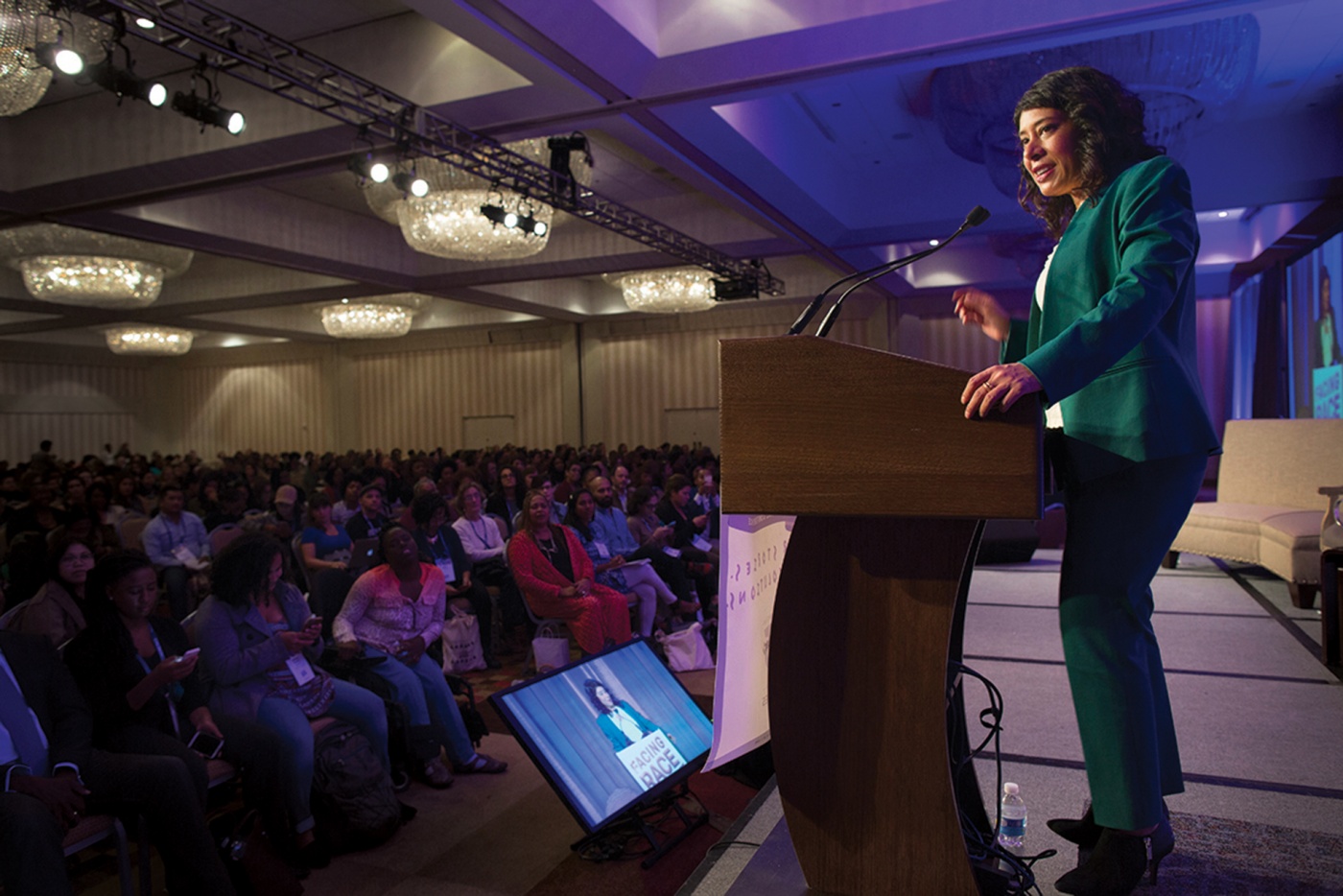
Becoming an Activist
Born in Calcutta to an engineer father and a homemaker mother (she has one sister, Chaitali Sen, a writer based in Austin), Sen moved with her family to rural upstate New York when she was five. There she studied in a two-room schoolhouse until the family moved to Long Island and then Pennsylvania, as her father was outsourced out of one aluminum manufacturing job after another.
“I read Nancy Drew, Trixie Belden, The Hardy Boys, and the All-Of-A-Kind Family series about an immigrant Jewish family,” she says of her childhood reading. “And I identified so much with the eldest sister. I was a huge bookworm and still am.”
Sen says there were few books for kids about people of color. “My mother would read us stories in Bengali. One story ended with the kid biting her mother’s ear, which was so macabre.” She also loved the boarding school tales of the English writer Enid Blyton. “Those books are a part of growing up in India, and they made me want to go to boarding school so badly!” Yet she looks back at her love of them with amusement. “They’re so racist,” she laughs. “The dangerous people are always dark-skinned.”
Having skipped a grade, at sixteen she entered Brown, in part because its core curriculum would enable her to avoid math and science, which she hated at the time. She also avoided Brown’s Third World Transition Program. Having grown up in nearly all-white suburbs, she was deeply averse to seeing herself through the lens of race: “My white friends in high school had said, ‘We think of you as being just like us.’ I did not want extra help, and I felt that being part of anything explicitly racial would sideline me from being part of the whole University.”
But it was at Brown where she had her racial awakening. In September 1984, at the beginning of her sophomore year, two friends of color urged her to join them at a protest. Activists had a number of demands, including hiring more people of color, adding more racial and ethnic diversity in the curriculum, and creating a better meeting space for students of color. Sen demurred. “I just felt that race was not my concern, and rallies were not what I did,” she says.
But her friends argued that she was being irresponsible. “They said, ‘Rinku, it’s 1984. You’re not a minority, you’re a person of color. It’s time to grow up and go to the rally.’ So I did. And I think it was the first time since my family had emigrated twelve years before that I really felt like I belonged and realized that being an American is not about looking like Marcia Brady. It was very different from the inertia of life in white suburbs that has you thinking that color blindness is a real thing and something to aspire to.”
Sen became an activist. Her senior year, she took off a semester to work in Washington, D.C., with the U.S. Student Association and the Midwest Academy, the institute devoted to the writings of Saul Alinsky. “That year taught me you could actually have a career as an organizer,” she says.
After Brown, she spent twelve years at the Center for Third World Organizing (CTWO) in Oakland, California, first under Delgado, then as codirector with Francis Calpotura. Together, they recast Alinsky’s identity-neutral theories of organizing to address gender, race, and economic justice, building a collaboration called the Campaign for Community Safety and Police Accountability. “It was a very post–Rodney King campaign,” Sen says. “It was a total precursor to Black Lives Matter.”
“I thought she might be too nice for community organizing,” Delgado says of his first meeting with Sen. “As a door-knocker, she had tremendous empathy, an ability to listen and win people over. And she will smile at you, but she is stubborn as the day is long.”
Delgado says Sen played a major role in making CTWO incorporate gender and sexuality issues into its racial work—that she was an early proponent of what today is called intersectionality, the idea that various movements and struggles are interrelated. That is perhaps not surprising, given that Sen headed the Women’s Political Task Force while at Brown, although she laughingly admits, “I can’t remember a thing we worked on.”
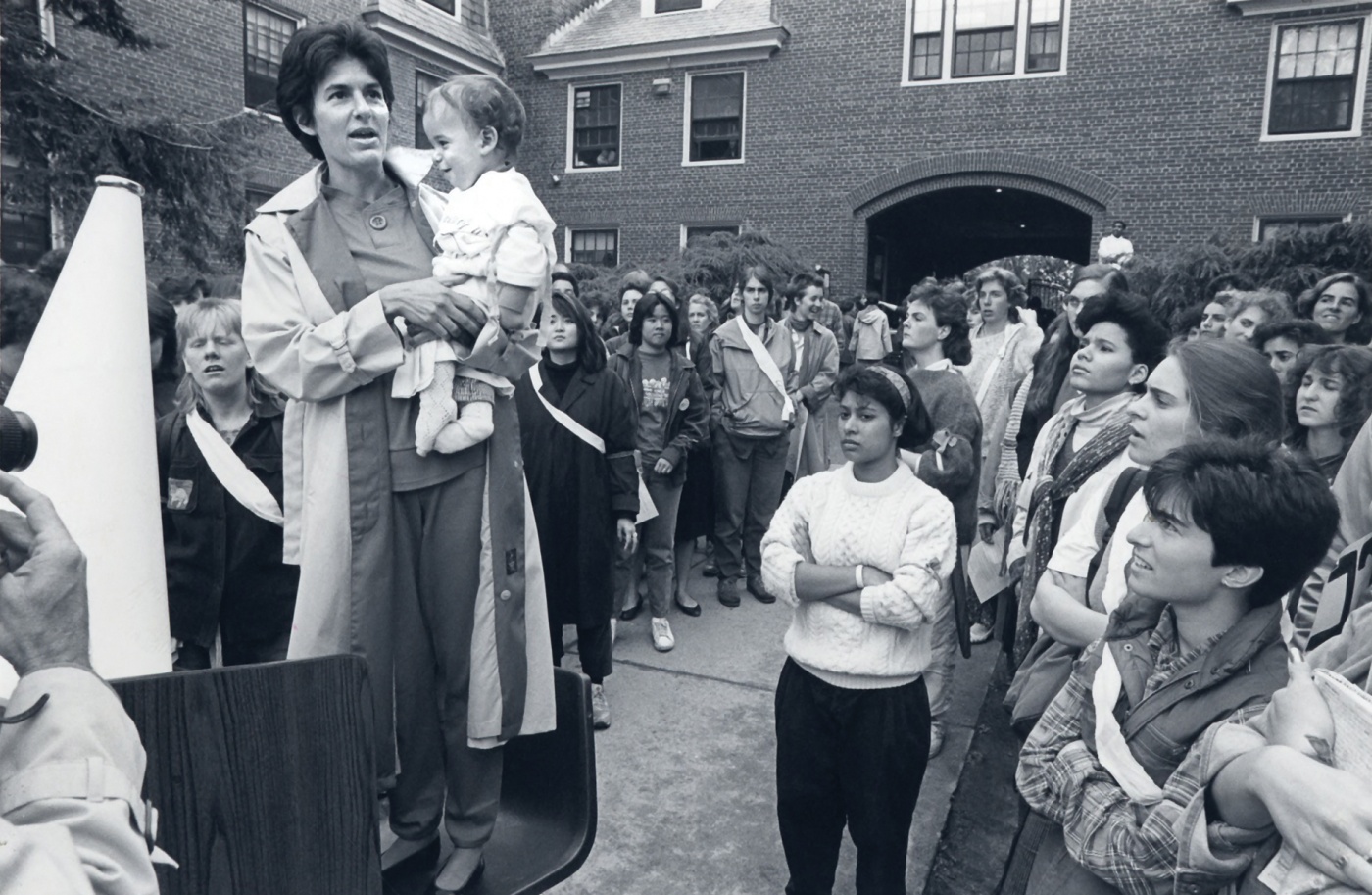
Meanwhile, Delgado started a new racial justice organization called the Applied Research Center, which Sen joined in 2001, moving to New York City to help set up an office there and to attend the Columbia Graduate School of Journalism. “I went with the tactical idea of learning what mainstream people thought,” she says, in order to better speak to them once she returned to organizing. “But it turned out I loved reporting, researching, and telling stories.”
She also learned how powerful strong narrative was in getting people to change their minds around race and other issues. “People need stories with a plot, action, a change between the beginning and the end, for it to strike the human brain. I came out feeling like there was a lot of openness in the mainstream media for stories about racial organizing, so I’ve tried to push us past just general description.”
Sen became so immersed in journalism that, when Delgado announced in 2005 that he was leaving the Applied Research Center (which became Race Forward in 2013), she considered not going for the top slot. But ultimately “it came down to how could I make the biggest change,” she says. “Working alone as a freelancer or with this political family I’d built over twenty-one years?” She applied for the job and got it.
Now, Sen is at another juncture. Race Forward is about to merge with a similar organization, the Center for Social Inclusion (CSI), whose president, Glenn Harris, will fill the lead role. Sen will become a strategy adviser and plans to make journalism more central to her work.
She’d also like to start a new content channel that incorporates diverse perspectives. “I’ve made a couple of libertarian friends, and I’m interested in their worldview,” she says. “Communities of color have had so much social control and policing heaped on them.” That’s why she’s intrigued by a political philosophy whose core is, she says, “‘leave me alone to do what I’m going to do.’ I just like the independence and freedom of it.”
Setting a New Agenda
In a 2012 speech, Sen seemed hopeful about the future. President Obama had been elected to a second term and a draconian three-strikes law for often minor criminal offenders had been beaten back in California. Things looked good for progressives like Sen. “We’ve reached the age of majority,” she says. “No one is going to shut the door or take away the car keys. We are going to set the agenda.” By the end of 2016, Donald Trump had been elected president, and Congress had become far more conservative.
“Progress for some can make others feel embattled,” she says. “Racism was coded under many past presidential administrations, such as President Reagan’s railing against ‘welfare queens’ when everyone knew he was talking about black people. And even Clinton attacked welfare for political points. But Trump has emboldened many people who now think they can say or do whatever racist thing occurs to them. If you’re in a workplace where two years ago people felt like they couldn’t use the N-word but now they can, that’s a bad effect. We have to say that racist language is not acceptable, even if the president uses it. And we have to continue the work we’ve been doing to reveal how systemic racism is.”
In Salinas a Puerto Rican woman replaced a white man as chief of police. But, according to public works director Petersen, the still largely white police force pushed back hard during Sen’s racial trainings. “They said, ‘You’re calling us racist, and we’re not racist,’” he recalls, admitting that some minds will not be changed. Salinas, he adds, may have to wait until older workers retire and can be replaced with a more diverse generation of workers more sympathetic to a racial-justice agenda.
So Sen takes the long view. “I ground myself in history and other struggles that seemed impossible when people were in the middle of them,” she says. “Ending slavery must have seemed impossible, but it got done, even though the system fought back with new forms of oppression. The struggle is never over. But I’m pragmatic. There’s always a next step. So I try to figure out what it is and take it.”
Tim Murphy, who writes on politics, culture, and LGBT issues, is the author of the new novel Christodora.

